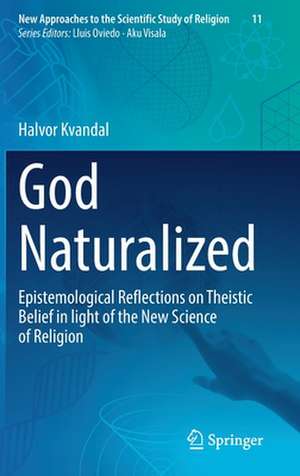God Naturalized: Epistemological Reflections on Theistic Belief in light of the New Science of Religion: New Approaches to the Scientific Study of Religion, cartea 11
Autor Halvor Kvandalen Limba Engleză Hardback – 28 oct 2021
With regard to CSR, this volume offers a sustained and critical investigation of the neutrality and positive-relevance view, before offering a re-appraisal of the conflict view. The text argues that when scrutinizing these views, much more attention must be paid to specific normative premises that allow empirical findings to have epistemic relevance. A novel feature is the theoretical application of analytical epistemology in virtue-epistemology to the central question of whether CSR undermines, supports, or is neutral with respect to religious belief. This book appeals to upper-level students and researchers in the field.
| Toate formatele și edițiile | Preț | Express |
|---|---|---|
| Paperback (1) | 692.74 lei 6-8 săpt. | |
| Springer International Publishing – 29 oct 2022 | 692.74 lei 6-8 săpt. | |
| Hardback (1) | 698.94 lei 6-8 săpt. | |
| Springer International Publishing – 28 oct 2021 | 698.94 lei 6-8 săpt. |
Preț: 698.94 lei
Preț vechi: 822.29 lei
-15% Nou
Puncte Express: 1048
Preț estimativ în valută:
133.74€ • 145.73$ • 112.70£
133.74€ • 145.73$ • 112.70£
Carte tipărită la comandă
Livrare economică 24 aprilie-08 mai
Preluare comenzi: 021 569.72.76
Specificații
ISBN-13: 9783030831776
ISBN-10: 3030831779
Pagini: 204
Ilustrații: VII, 204 p.
Dimensiuni: 155 x 235 mm
Greutate: 0.48 kg
Ediția:1st ed. 2022
Editura: Springer International Publishing
Colecția Springer
Seria New Approaches to the Scientific Study of Religion
Locul publicării:Cham, Switzerland
ISBN-10: 3030831779
Pagini: 204
Ilustrații: VII, 204 p.
Dimensiuni: 155 x 235 mm
Greutate: 0.48 kg
Ediția:1st ed. 2022
Editura: Springer International Publishing
Colecția Springer
Seria New Approaches to the Scientific Study of Religion
Locul publicării:Cham, Switzerland
Cuprins
Chapter 1. When Cognitive Science enters the Science and Religion Debate.- Chapter 2. The Ultimate Origin of Religion.- Chapter 3. The Proximate Origin of Religion.- Chapter 4. Theistic Evidentialism and the Cognitive Science of Morality.- Chapter 5. Do We Have A God-Faculty? A New Appraisal of Reformed Epistemology.- Chapter 6. A Virtue Epistemology for the Theistic Disposition.- Chapter 7. Troubled Navigation: Evaluating the Theistic Disposition.- Chapter 8. Cognitive Science And Theist Religion: An Unhappy Marriage?.
Recenzii
“Kvandal raises some interesting new arguments drawn from recent explanations of religious belief. His naturalistic perspective is refreshing given the dominance of theistic (Christian) interpretations of the epistemic implications of the theories. … His book thereby shows that new explanations can and do present real challenges to the epistemic status of religious belief that cannot be discarded by hand-waiving replies.” (Hans Van Eyghen, International Journal for Philosophy of Religion, Vol. 94 (2), 2023)
“Who should read this book? Someone who believes that at an intellectual level, the relationship between theistic beliefs and the cognitive science of religion it is important. Almost all of the real people in the world who hold theistic beliefs never heard of the cognitive science of religion.” (Jay R. Feierman, Reviews in Science, Religion and Theology, Vol. 1 (1), March, 2022)
Notă biografică
Halvor Kvandal holds a PhD in philosophy from the Norwegian University of Science and Technology (NTNU). He currently works at Queen Maud University College of Early Childhood Education, Norway. Kvandal’s research interests focus on the intersection between naturalistic theories of religion and the philosophy of religion, especially epistemology.
Textul de pe ultima copertă
This volume argues that theistic philosophy should be seen not as an “armchair” enterprise but rather as a critical endeavor to bring philosophy of religion into close contact with emerging sciences of religion. This text engages with the rationality of religious belief by investigating central problems and arguments in philosophy of religion from the perspective of new naturalistic research. A central question the book analyzes is whether findings in cognitive science of religion (CSR) falsify or undermine religious ideas and beliefs.
With regard to CSR, this volume offers a sustained and critical investigation of the neutrality and positive-relevance view, before offering a re-appraisal of the conflict view. The text argues that when scrutinizing these views, much more attention must be paid to specific normative premises that allow empirical findings to have epistemic relevance. A novel feature is the theoretical application of analytical epistemology in virtue-epistemology to the central question of whether CSR undermines, supports, or is neutral with respect to religious belief. This book appeals to upper-level students and researchers in the field.
With regard to CSR, this volume offers a sustained and critical investigation of the neutrality and positive-relevance view, before offering a re-appraisal of the conflict view. The text argues that when scrutinizing these views, much more attention must be paid to specific normative premises that allow empirical findings to have epistemic relevance. A novel feature is the theoretical application of analytical epistemology in virtue-epistemology to the central question of whether CSR undermines, supports, or is neutral with respect to religious belief. This book appeals to upper-level students and researchers in the field.
Caracteristici
Uniquely criticizes neutrality-views of cognitive science of religion (CSR) and its impact on the rationality of religious belief Brings together new research on cognitive biases, cultural evolution, in-group/out-group bias, and the psychology of religious-belief-formation Relates research to central issues in the philosophy of religion Places the current debates on evolution into the perspective of virtue-epistemology













